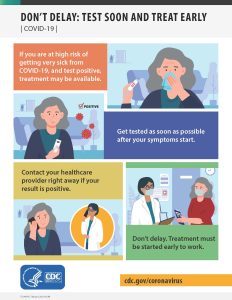As of March 1, 2024, The CDC updated recommendations for how people can protect themselves and their communities from respiratory viruses, including COVID-19. The new guidance brings a unified approach to addressing risks from a range of common respiratory viral illnesses, such as COVID-19, flu, and RSV.
When people get sick with a respiratory virus, the updated guidance recommends that they stay home and away from others. For people with COVID-19 and influenza, treatment is available and can lessen symptoms and lower the risk of severe illness. The recommendations suggest returning to normal activities when, for at least 24 hours, symptoms are improving overall, and if a fever was present, it has been gone without use of a fever-reducing medication.
As part of the guidance, CDC provides active recommendations on core prevention steps and strategies:
- Staying up to date with vaccination to protect people against serious illness, hospitalization, and death. This includes flu, COVID-19, and RSV if eligible.
- Practicing good hygiene by covering coughs and sneezes, washing or sanitizing hands often, and cleaning frequently touched surfaces.
- Taking steps for cleaner air, such as bringing in more fresh outside air, purifying indoor air, or gathering outdoors.
Additional prevention strategies you can choose to further protect yourself and others include:

In accordance with this update, GHC has updated the Charge Ahead Campus Guidelines and Quarantine Protocol, which provides helpful information on the virus. For questions not answered on these webpages, please reach out to HR_COVID-19@highlands.edu. Each individual is responsible for themselves and doing their part to make certain that they are safe and able to resume their activities as a student or employee of GHC.
Learn more about The CDC’s current guidance on Covid-19 and other respiratory viruses.